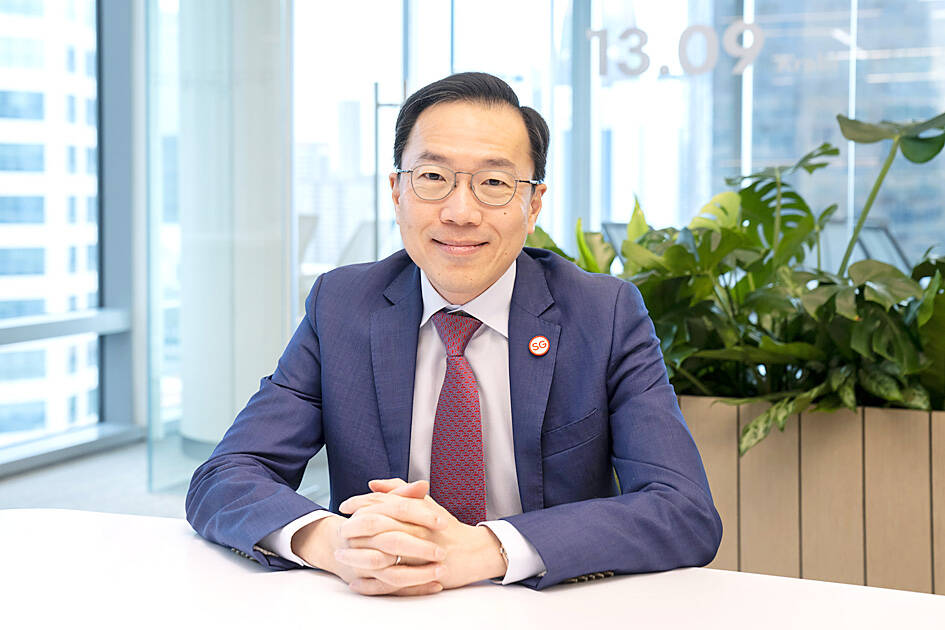Singapore would seek to win its “fair share” of investments in semiconductor assembly and integrated circuit design, a top official said yesterday, amid a growing geopolitical divide between the US and China over trade and technology.
The city-state is to focus on the semiconductor value chain of activities, Singapore Economic Development Board (EDB) Chairman Beh Swan Gin (馬宣仁) said in an interview with Bloomberg Television, as he discussed the fallout of the US’ Creating Helpful Incentives to Produce Semiconductors (CHIPS) and Science Act, aimed at wooing investments back to the US and stemming China’s economic influence.
The move by US President Joe Biden’s administration is a “muscular industrial policy to bring back manufacturing and technology development to the US,” Beh said. “It has definitely made competition for investments more intensive and certainly for the type of investments that today Singapore is also aiming for.”

Photo: Bloomberg
“We will have to take it as it is and we will do our best to secure our fair share,” he said, adding separately that Singapore accounts for about 5 percent of the global wafer fabs output.
Singapore last year attracted a record S$22.5 billion (US$16.88 billion) in fixed-asset investment commitments, nearly double the S$11.8 billion level the previous year, thanks to what Beh described as an “unprecedented semiconductor super-cycle.”
The EDB sees Singapore continuing to attract mature nodes and wafer fabs, in addition to design-related chips jobs that are growing steadily, although it might not repeat last year’s performance in terms of investments.
“We are a small country, so in a way the share of the pie that we need to ensure to continue to develop our economy is relatively small,” Beh said.
The IMF forecasts that the global economy would expand 2.9 percent this year, slower than the 3.4 percent pace of last year amid restrictive monetary policies crimping demand.
That is tempering Singapore’s expectations for investment flows, with fixed-asset investment commitments seen in a range of S$8 billion to S$10 billion in the medium to long-term.
Still, the EDB has touted Singapore’s evergreen attractiveness, thanks to its track record of “stability and trust.”
That reputation was reinforced by Singapore’s deft handling of the COVID-19 pandemic, it said.

SEASONAL WEAKNESS: The combined revenue of the top 10 foundries fell 5.4%, but rush orders and China’s subsidies partially offset slowing demand Taiwan Semiconductor Manufacturing Co (TSMC, 台積電) further solidified its dominance in the global wafer foundry business in the first quarter of this year, remaining far ahead of its closest rival, Samsung Electronics Co, TrendForce Corp (集邦科技) said yesterday. TSMC posted US$25.52 billion in sales in the January-to-March period, down 5 percent from the previous quarter, but its market share rose from 67.1 percent the previous quarter to 67.6 percent, TrendForce said in a report. While smartphone-related wafer shipments declined in the first quarter due to seasonal factors, solid demand for artificial intelligence (AI) and high-performance computing (HPC) devices and urgent TV-related orders

BYPASSING CHINA TARIFFS: In the first five months of this year, Foxconn sent US$4.4bn of iPhones to the US from India, compared with US$3.7bn in the whole of last year Nearly all the iPhones exported by Foxconn Technology Group (富士康科技集團) from India went to the US between March and last month, customs data showed, far above last year’s average of 50 percent and a clear sign of Apple Inc’s efforts to bypass high US tariffs imposed on China. The numbers, being reported by Reuters for the first time, show that Apple has realigned its India exports to almost exclusively serve the US market, when previously the devices were more widely distributed to nations including the Netherlands and the Czech Republic. During March to last month, Foxconn, known as Hon Hai Precision Industry

Taiwan Semiconductor Manufacturing Co (TSMC, 台積電) and the University of Tokyo (UTokyo) yesterday announced the launch of the TSMC-UTokyo Lab to promote advanced semiconductor research, education and talent development. The lab is TSMC’s first laboratory collaboration with a university outside Taiwan, the company said in a statement. The lab would leverage “the extensive knowledge, experience, and creativity” of both institutions, the company said. It is located in the Asano Section of UTokyo’s Hongo, Tokyo, campus and would be managed by UTokyo faculty, guided by directors from UTokyo and TSMC, the company said. TSMC began working with UTokyo in 2019, resulting in 21 research projects,

Quanta Computer Inc (廣達) chairman Barry Lam (林百里) yesterday expressed a downbeat view about the prospects of humanoid robots, given high manufacturing costs and a lack of target customers. Despite rising demand and high expectations for humanoid robots, high research-and-development costs and uncertain profitability remain major concerns, Lam told reporters following the company’s annual shareholders’ meeting in Taoyuan. “Since it seems a bit unworthy to use such high-cost robots to do household chores, I believe robots designed for specific purposes would be more valuable and present a better business opportunity,” Lam said Instead of investing in humanoid robots, Quanta has opted to invest